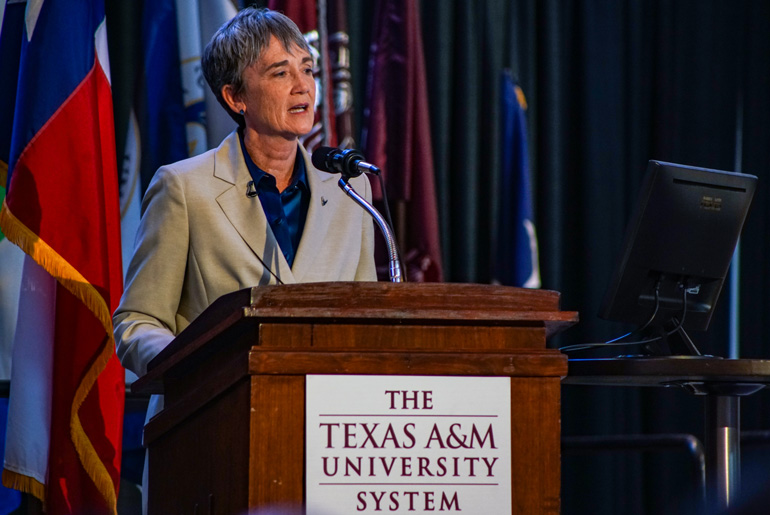
Secretary of the U.S. Air Force Heather Wilson and more than 400 invited guests from academia and industry gathered at Texas A&M University for the Air Force Science and Technology 2030 Forum.
“Texas A&M is honored to host Secretary Wilson and other distinguished guests on our campus today,” said Michael K. Young, president of Texas A&M. “As a tier-one research university, discovery and innovation are paramount to our mission in education and also in supporting the U.S. Air Force in foreseeing tomorrow’s technology.”
Wilson launched an initiative in September 2017 to update the Air Force’s science and technology strategy by hosting discussions about research innovations with the scientific community, prestigious research universities and business professionals.
“With this initiative we are going out to listen to Americans, from higher education to small and large businesses, to understand what basic and applied technologies will help us create the next game-changing inventions for 2030 and beyond,” said Maj. Gen. William Cooley, Air Force Research Laboratory commander.
“Texas A&M has a long history of producing talented graduates who go on to distinguished careers in the Air Force and our other military branches,” said Wilson. “We look forward to engaging with the university on the basic and applied research that will shape the future of our Air Force.”
As one of only 17 institutions in the nation to be designated a land-, sea- and space-grant university, Texas A&M was the perfect setting for this unique opportunity to help shape discussions on research innovations for the next generation of technology used by the U.S. Air Force.
“Some of the most important and high-stakes research in the country is going on right here at Texas A&M University,” said Texas A&M University System Chancellor John Sharp. “Aggies can always be counted on to help with matters of national security.”
Panel discussions at the workshop focused on four important research areas: space situational awareness; nuclear delivery systems; hypersonics, lasers and electromagnetics; and engineering and military medicine.
“Texas A&M has one of the largest and most diverse defense research programs in the nation and a long history with the Air Force in advancing key technologies,” said M. Katherine Banks, vice chancellor and dean of Texas A&M Engineering. “We are honored to host this forward-thinking and vision-inspiring event as the Air Force prepares for a technology future that for many is difficult to fathom.”
Ideas generated from the forums will be gathered, and those with the greatest promise will be considered by a panel chaired by the chief scientist of the Air Force. Selected research opportunities will then be documented in a formal report to the secretary of the Air Force in September to help shape Air Force research investments over the coming decade.
Texas A&M is one of six university locations across the country to host the Air Force Science and Technology 2030 Forum. The forums were held earlier in the year at the University of Nebraska, University of South Florida, Indiana University and University of Washington. The final forum will be held at the University of Utah.
